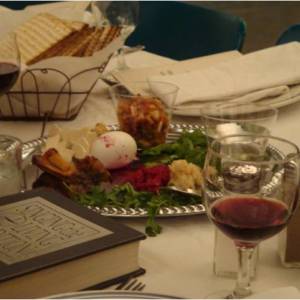
For Jews without close family ties, the approach of Passover can elicit the same gnawing anxiety that Thanksgiving does: While the rest of humanity gathers around tables laden with a home-cooked feast and lifts glasses of wine, you’ll be dining at home alone on leftovers in front of the TV.
Now that I look forward to the companionable routine of Thanksgiving with good friends in my old building, I can laugh at some of the more oddball Thanksgivings I’ve known: a vegetarian dinner for 80 people in a Manhattan ashram that was covered by Channel 2 news; hotdogs and ice cream sandwiches at a showing of “Crocodile Dundee” somewhere near Pomona, California (because a friend and I were starving two hours after the perfunctory meal at another friend’s retirement community, and nothing else was open).
Passover has proven to be a bit more problematic. I don’t have many close friends who observe it, and most are too far away, as “real” seders usually end well after midnight.
The first seder I ever attended in New York (in 1976) was at the home of Sylvia Straus Heschel, a pianist and the widow of Rabbi Abraham Joshua Heschel, and it was led by their daughter, Susannah. A four- or five-hour affair with copious feminist commentary led by a young woman my own age was an eye-opener; my family’s seders had always been strictly “by the book” and led by my father.
A dozen years later, I was inducted into the rowdy Passover rituals of a neighbor’s cousin, an actor and mask-maker, which included much wine-spilling and macaroon-hurling. Eighteen or so mostly theatrical types squeezed in around two tables pushed together; I recall one year, we read portions of the Haggadah in “rap” style as we went around the table. The cousin’s marriage brought Passover decorum for a couple years; his divorce returned the proceedings to their usual mayhem. I eventually stopped going when it got to the point that I needed to head home at 11 before having eaten anything other than matzoh-ball soup.
In contrast, it was disappointing to discover that another friend’s mother’s idea of a seder was a 20-minute dip into the Haggadah before serving dinner. Still another “seder” I was invited to left off after the first page! Where were the plagues, the pharaohs, the four questions, the visit from Elijah, the many rabbis with unpronounceable names? While everyone looks forward to the meal, it’s not the entire point; the word “seder” means “order” or “sequence.” Recounting the story of Passover and honoring the struggles of our ancestors (and those yet enslaved around the world) evokes a powerful sense of connection to generations of humanity. Jews have been sitting down to this annual ritual for thousands of years—in many cases, risking death to do so. How lucky we are!
Though Passover is one of the times I crave tradition, I’ve finally embraced the expectation of something new most years. (After all, the Jews were facing the unknown as they hurried out of Egypt.) As a seder orphan, I’ve attended a Unitarian one (a gracious balance between tradition and modernity) and another that featured a belly dancer with a sword on her head. Once, I somewhat ashamedly found myself hinting broadly (just hours before Passover) and was generously folded into a lovely gathering that included the four questions asked in several languages, as well as the Persian Jewish tradition of whacking each other with scallions before singing “Dayenu,” to recall the whips of the Egyptian slave-drivers.
One year, unable to afford my then-temple’s seder, I was directed by a friend to another local communal seder that turned out to be attended almost entirely by elderly Russian Orthodox Jews who spoke minimal English. Rather than panic, I resolved to turn it into an adventure. What I remember most is the courtly gentleman to my right whose eyes lit up at the chance to practice his English. At one point, he laid his hand on my arm and leaned forward, signaling the readiness of a sentence he had spent several minutes composing in his mind: “I live in Moscow for 76 years, I never feel free. I live in New York one year, I feel free!” How can you beat that for embrace of the new?
The past two years have brought their share of tribulations as I’ve been uprooted from work and home. But thanks to another friend, at Passover I’m once more enveloped in three generations of family, a treasured cross-stitched tablecloth beneath the seder plate and glowing candles. Some of the people I knew before, some I didn’t—and all of us felt like good friends by the end of the night. With any luck … next year, again in Washington Heights!
Jane Rubinsky, a writer/editor specializing in non-profit communications and journalism, is a member of Congregation Rodeph Sholom in New York City.
Related Posts

Harnessing the Power of our Mothers Around the Seder Table

Melding Tradition and Innovation: Our Interfaith Toddler Naming Ceremony

